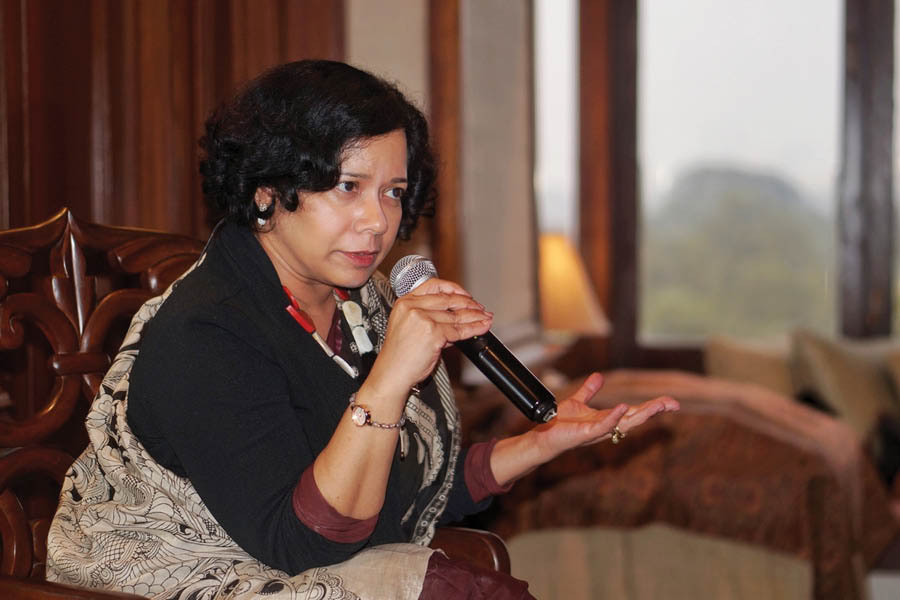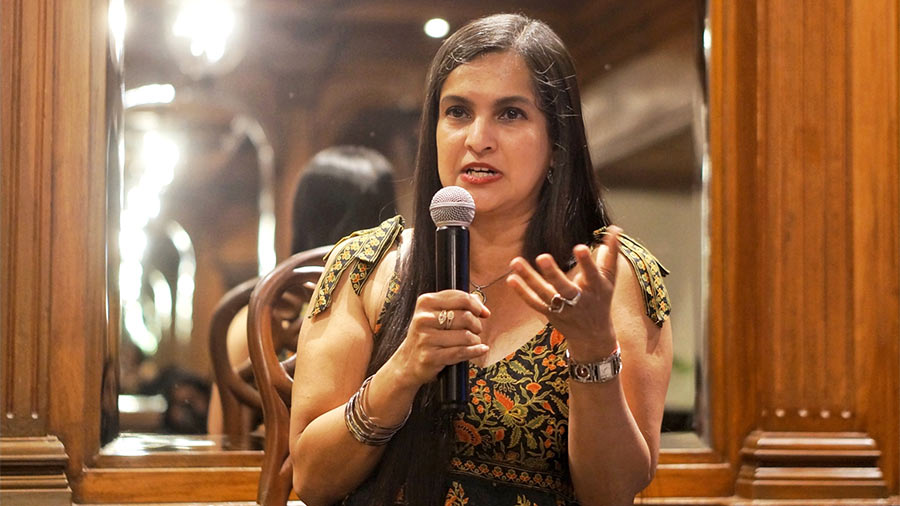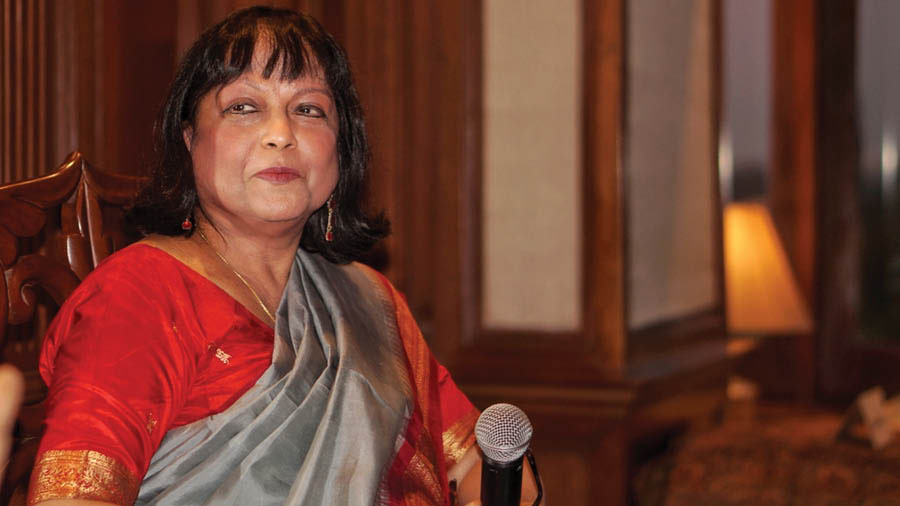“So much of history is about exchange. And that exchange can be both good and bad,” said academic and author Nandini Das while discussing her latest book, Courting India: England, Mughal India and the Origins of Empire, at the latest session of An Author’s Afternoon, organised by Prabha Khaitan Foundation in association with Shree Cement Limited, with My Kolkata as digital partner.
Thomas Roe arrived in India in 1616 as an ambassador of James I. Being the first English ambassador, he came bearing the task of establishing trading relationships between the fledgling British Empire and the opulent Mughal Empire under Jahangir. Das’s book chronicles the time that Roe spent in India and explores the history of the period through the exchanges between the two disparate cultures. In her conversation with Abhijit Gupta, professor at the Department of English at Jadavpur University, Das explored the process of her research, storytelling, and more, with an attentive audience at Taj Bengal.
The love for narratology
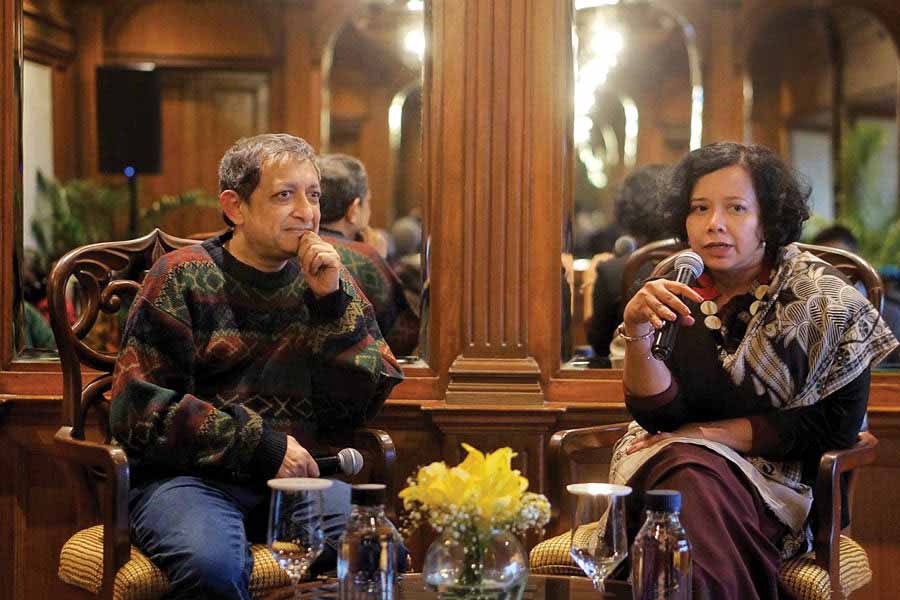
Abhijit Gupta (left) in conversation with Das
Winning a Rhodes Scholarship to the University of Oxford changed Das’s life. It was transformative because it allowed her to read whatever she wanted. Her early interests in the novel finally culminated into a love for narratology, wherein travelling was a constant theme.
“While the novel, as we recognise it, emerged in the 18th century, my exploration extended back to the late 16th century. This period witnessed a generation of well-educated youth in London facing an economic crisis, reminiscent of certain contemporary challenges. In the late 1500s, with an ageing queen (Elizabeth I), economic turmoil and limited job opportunities for recent graduates, these well-educated scholars found themselves at a crossroads. Frustrated by the lack of employment, they turned to writing imaginative stories in prose, marking a shift towards fiction that resonates with today’s popular genres,” explained Das.
This narrative thread appears frequently in Das’s work on travel — both directly and indirectly. For her, travel remains a “timeless human experience”, which has been a constant theme in literature, from the earliest forms to contemporary genres like railway station novels or airport novels.
The curious case of Thomas Coryat
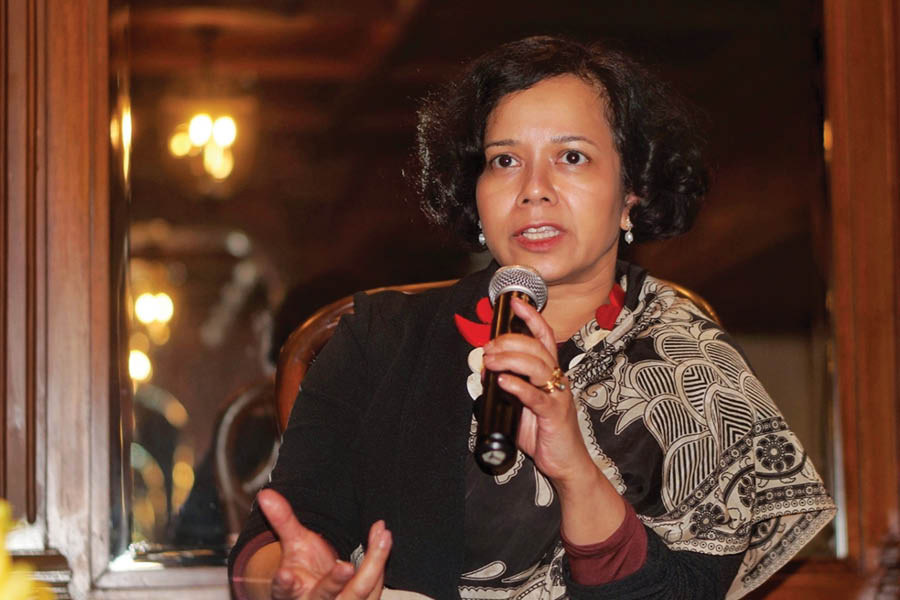
Das spoke about Thomas Coryat as a contrasting character to Thomas Roe
While Roe was someone who insisted on “commercial enterprise” rather than a “colonial initiative”, he was also deeply critical of what he saw in India. As a contrast to him is the character of Thomas Coryat, who was also a traveller and who bet that he would travel to India on foot, only to never return.
“While Coryat had the potential to be a modern-day celebrity like Orry, hanging out with the who’s who of England, he remained relatively unknown. However, he was deeply motivated to make a name for himself. To achieve this, he devised a clever plan — he began taking bets, challenging himself to walk around Europe. People would bet against him, and he would successfully complete the journey, documenting his experiences in a book. This dual-income strategy made him one of the earliest English celebrities.
“Having accomplished his European journey, Coryat faced the challenge of surpassing himself. The solution? A daring plan to walk across the land of the great Mughals. This decision was influenced by the cultural zeitgeist of the 1590s, with Christopher Marlowe’s blockbuster play Tamburlaine shaping the popular imagination. The plan was not merely an adventure; it was a bid to win more bets and further enhance his celebrity status. Unfortunately, he never returned,” noted Das.
‘I wanted to convey the story in a way that was pleasurable to my readers without losing the academic rigour’
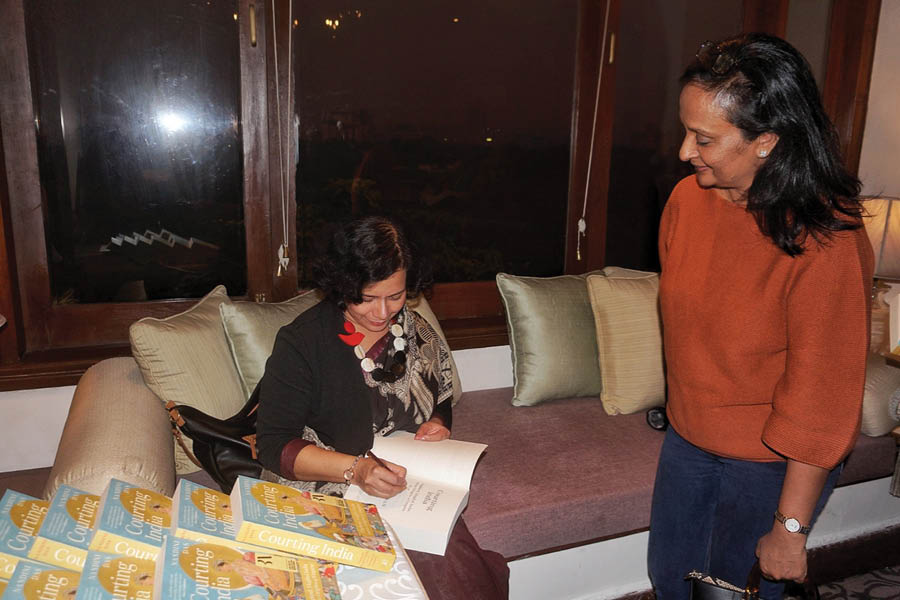
Das signing copies of her book, ‘Courting India’
Even though Roe’s journey to India spanned a mere five years, it has been particularly significant in terms of India’s history. Das leaned into that history to become, as she said, a “historical eavesdropper,” rummaging through art, letters and literature to unearth different narratives.
“The East India Company, newly granted its trading licence just before Elizabeth I’s death, struggled in a challenging geopolitical landscape. With Spain at their doorstep and a new monarch, James VI, on the throne, the nation faced complexities. When Roe was sent to India, he functioned as an ambassador under pressure, needing to secure trading licences from the East India Company and convince Jahangir of England’s trading worth. The Portuguese had deliberately kept England and Protestantism concealed from the Mughals, making Roe’s mission daunting,” elaborated Das.
But academic writing is often weighty and inaccessible to common readers. So how did Das manage to present a large amount of historical information in a manner that was also pleasant to read?
“I'm a literary scholar by training and one of the things that I would firmly tell my students, which I try to practise myself, is that we have an aesthetic responsibility towards our readers. If we’re writing about beautiful literature that plays with language and themes and ideas, we owe our readers that exact same pleasure. When I was writing the book, I was equally conscious of a sense of double duty: I wanted to convey the story in a way that was pleasurable to my readers without losing the academic rigour,” concluded Das.
The session came to a close with a Q&A interaction with the audience. Anindita Chatterjee, executive trustee of the Foundation, delivered the vote of thanks.
Guests speak
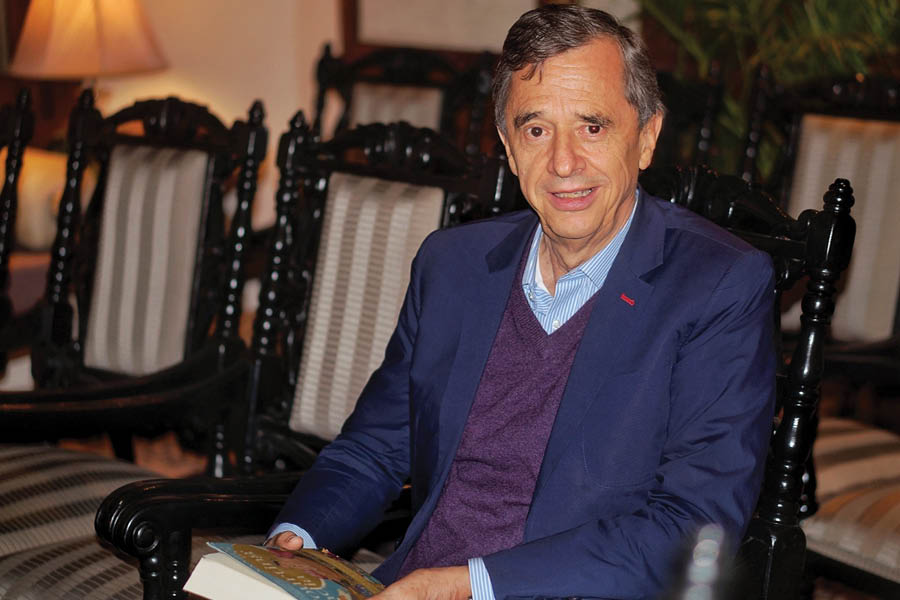
Juergen Gerhard Kurzhals
“I’m curious to read the book and see how Das’s view of India in those days will be different from the descriptions we’ve become accustomed to. I find it very difficult to believe that there’s such an abundance of material… If it’s the 1600s, how do you source all of that? If she has sourced it successfully and that too within 10 years, then I think she has done a fantastic job!”
— Juergen Gerhard Kurzhals, deputy consul general, Consulate General of the Federal Republic of Germany in Kolkata
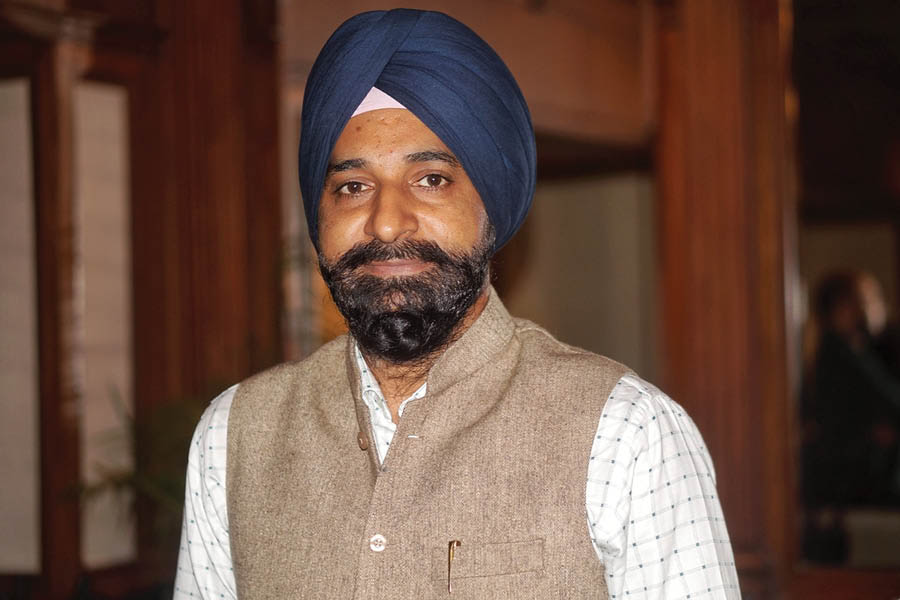
Rupinder Singh
“It was intriguing to know about some of the first people who came to India. I really enjoyed the session.”
— Rupinder Singh, deputy commandant, BSF
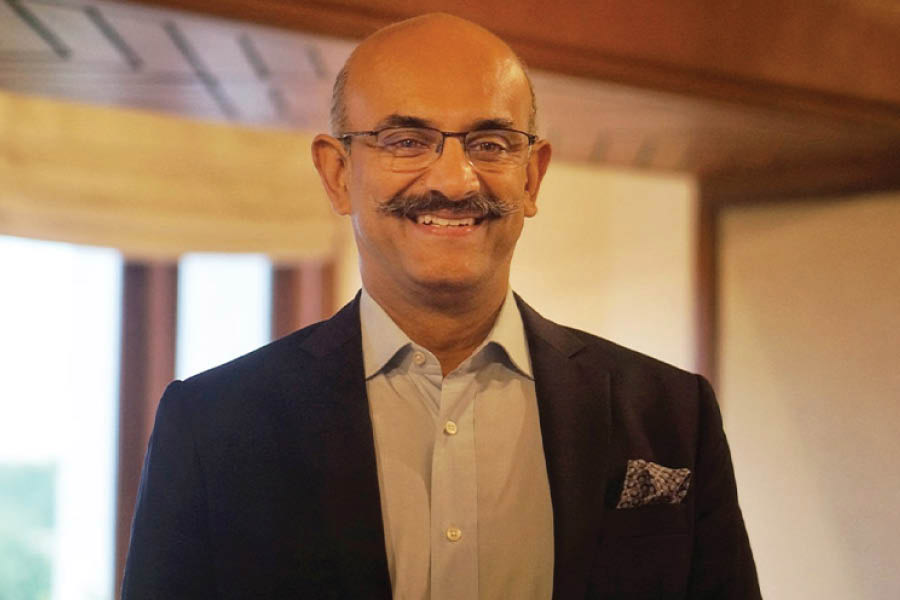
K. Mohanchandran TT archives
“I really enjoyed Courting India, from a period I know little of. The meticulous research the author has done makes for a gripping read, almost making the reader a participant in the Mughal court of the time.”
— K. Mohanchandran, senior vice president of operations, IHCL
